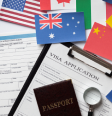A work visa is a type of visa that allows foreign nationals to enter and work in a country for a specified period. The requirements, application process, and conditions for obtaining a work visa vary depending on the country, the type of work you intend to do, and sometimes even the duration of your employment. Below are general steps and important details about work visas.
Choose Country of Your Choice
General Steps for Obtaining a Work Visa:
-
Secure a Job Offer:
- In most cases, before applying for a work visa, you must have a job offer from an employer in the country where you plan to work. The employer may be required to prove that they couldn’t find a local worker for the position.
-
Understand Visa Requirements:
- Different countries have different types of work visas, such as skilled worker visas, intra-company transfer visas, or temporary work visas. Requirements often include:
- Valid passport: Your passport should be valid for the entire duration of your employment.
- Job offer: An employment contract or offer letter from the employer in the destination country.
- Work permit: Some countries require a separate work permit in addition to the visa.
- Proof of qualifications: Degrees, certifications, or any professional credentials required for the job.
- Health and police clearances: Some countries may require proof of good health (medical exams) and a police clearance to show you have no criminal record.
- Financial proof: Some countries require proof that you have sufficient funds to support yourself until you start receiving wages.
- Language proficiency: In some cases, you may need to demonstrate proficiency in the official language of the country.
- Different countries have different types of work visas, such as skilled worker visas, intra-company transfer visas, or temporary work visas. Requirements often include:
-
Employer-Sponsored Work Visa:
- In many cases, your employer will sponsor your visa by initiating the process. The employer may need to file documents with their country’s immigration or labor department to obtain authorization to hire foreign workers.
- Labor Market Test: In some countries, the employer must prove they couldn’t find a qualified local worker for the position before hiring a foreign national.
-
Submit the Work Visa Application:
- Once you have the necessary documents from your employer, you can submit your visa application at the embassy or consulate of the destination country. Some countries offer online visa applications.
- Required documents typically include your passport, the visa application form, photos, the job offer, proof of qualifications, and any other specific documents required by the country.
- In some cases, you may need to attend an interview at the embassy or consulate.
-
Pay Visa Fees:
- You must pay the visa application fee. The cost varies by country and type of visa.
-
Attend a Biometric Appointment (if required):
- Many countries require biometric data (fingerprints and a photograph) to be submitted as part of the visa application process. You will usually need to attend a biometric appointment at a visa application center or embassy.
-
Wait for Visa Processing:
- The processing time for a work visa varies, but it can take several weeks to a few months depending on the country, type of visa, and the time of year. Be sure to apply well in advance of your intended start date.
-
Receive Your Visa and Travel:
- Once your visa is approved, it will either be stamped in your passport or issued electronically. You can then travel to the destination country to start your employment.
-
Register with Local Authorities (if required):
- Some countries require you to register with the local authorities, immigration office, or obtain a residence permit after arriving in the country.
Types of Work Visas in Popular Destinations:
1. United States (H-1B, L-1, etc.):
- H-1B Visa: For skilled workers in specialty occupations (e.g., IT, engineering). You must have a job offer from a U.S. employer, and they must file a petition on your behalf. The visa is initially valid for three years and can be extended.
- L-1 Visa: For intra-company transfers, allowing employees of multinational companies to work in U.S. offices.
- O-1 Visa: For individuals with extraordinary ability in fields like arts, sciences, education, or business.
- Processing Time: H-1B visas are subject to an annual cap, and processing times can be lengthy, especially if applications are submitted during the annual lottery.
2. Canada (Work Permit, Express Entry):
- Temporary Foreign Worker Program (TFWP): Employers must get a Labor Market Impact Assessment (LMIA) to hire foreign workers unless the job is exempt.
- Express Entry: For skilled workers who wish to immigrate permanently. Points are awarded for factors like age, education, work experience, and language proficiency.
- Global Talent Stream: Fast-tracked visa for workers in tech and innovation sectors.
- Processing Time: Work permits can take from a few weeks to several months to process.
3. United Kingdom (Skilled Worker Visa):
- The Skilled Worker Visa (formerly Tier 2) allows skilled professionals to work in the UK. The job offer must be from a UK employer that holds a valid sponsor license.
- The applicant must meet English language requirements and earn a minimum salary. The visa is generally granted for up to five years, and it can lead to permanent residency.
- Intra-Company Transfer Visa: For employees transferring within a company to a UK branch.
- Processing Time: Generally, visa decisions are made within three weeks.
4. Australia (Temporary Skill Shortage Visa, Skilled Independent Visa):
- Temporary Skill Shortage Visa (subclass 482): Allows employers to sponsor skilled workers in industries where there is a shortage of local talent. This visa is valid for up to four years.
- Skilled Independent Visa (subclass 189): A points-based visa for individuals who are invited to apply based on skills and experience in demand in Australia.
- Processing Time: TSS visas generally take a few months to process.
5. Germany (EU Blue Card, Work Visa):
- EU Blue Card: For highly skilled non-EU citizens, it requires a job offer with a minimum salary requirement. The card is valid for up to four years.
- German Work Visa: For non-EU nationals with a job offer in Germany, especially in industries facing skill shortages (e.g., engineering, IT, healthcare).
- Processing Time: Applications can take a few weeks to months depending on the workload of the consulate.
6. United Arab Emirates (UAE Work Visa):
- Work visas are typically obtained through sponsorship by a UAE employer. The visa includes a residence permit, allowing the holder to live and work in the UAE.
- Employers usually handle most of the visa process on behalf of the employee.
- Processing Time: Work visas are processed within a few weeks, but this varies depending on the job and sector.
Additional Considerations:
- Visa Duration: Work visas are generally tied to your employment contract. If your job ends, your visa may also be terminated unless you transfer to a new employer who can sponsor your visa.
- Dependents: In many cases, work visa holders can bring their spouse and children as dependents, though they may need to apply for their own visas or permits.
- Path to Permanent Residency: Some work visas, such as the U.S. H-1B or the UK Skilled Worker visa, may offer a pathway to permanent residency or citizenship after a certain period of continuous employment.
- Taxes and Employment Laws: It’s important to understand the tax obligations and employment laws in your destination country, as they will affect your income and rights as a worker.
Each country has specific procedures and timelines for obtaining work visas, so it’s crucial to consult official government websites or seek legal advice if needed.

Fill In The Required Form
We offer comprehensive employment services such as assistance with employer compliance.

Submit Your Original Documents
We offer comprehensive employment services such as assistance with employer compliance.

Get The Visa Resource Material
We offer comprehensive employment services such as assistance with employer compliance.
There are full service engage company is to provide solution for employees needs training manage the entire HR department for companies. We offer comprehensive employment services such as assistance with employer compliance.Our company is your strategic HR partner as instead of HR.
Visa Question Related to Immigration Process
For the Career Adventurer: Propel your professional life by stepping into the global arena with a Work Visa. Tailored for job seekers and professionals desiring to elevate their careers, this visa paves the way for invaluable international work experience, networking, and growth opportunities in your chosen field.







